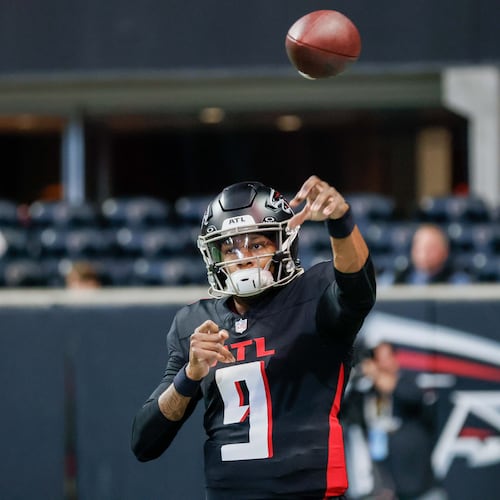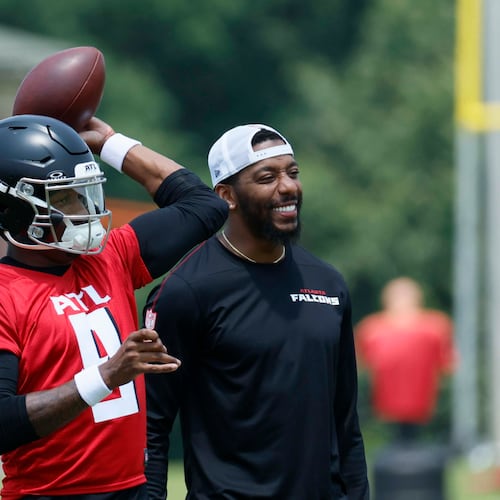Todd Gurley once was the NFL’s most feared running back. During his first few seasons with the Los Angeles Rams, Gurley established himself as someone who, with one cut, could take any carry for a long distance touchdown.
In 2017, he was the NFL’s Offensive Player of the Year. In 2018, he was the engine that drove the Rams’ offensive attack until his left knee began giving him problems late in the season and during the playoff run to the Super Bowl.
Fast forward to the present day, and Gurley since has been released, signed by the Falcons and demoted to a complementary role in a backfield that ranks 29th in the NFL at 93.7 rushing yards per game. Gurley began this season as the Falcons’ lead running back. Of late, he’s been relegated to third-down and red-zone opportunities.
Falcons interim coach Raheem Morris didn’t say that Gurley was unhappy with this late-season development. But Morris did note that Gurley has performed this role well in recent weeks, even if it’s a position he never expected to be in.
“When you’re particularly in a position like Todd Gurley is in, you’re not going to always like your role,” Morris said. “You don’t have to like it. You just have to execute it. What he’s been able to do the last couple of weeks is go out and execute his role at a high level. Those are the things you have to ask your team when you’re talking about winning football and trying to win football games.
“The only thing he can do right now is the role he’s been given. Go out and execute it, and he’s done a good job with that in the last couple of weeks.”
Gurley was scheduled to speak with reporters in a virtual news conference following Friday’s practice, but through a team representative, declined to do so.
This past offseason, Gurley signed a one-year contract worth $5.5 million. He began the season as the Falcons’ lead running back and received a healthy workload. Then, offensive coordinator Dirk Koetter said the plan was for Gurley to get an average of 15 to 20 touches per game to manage what has been described as an arthritic left knee, which stems from an ACL he tore when he was a junior at Georgia. In the early going of the season, the Falcons gave Gurley the consistent workload he received in his final year with the Rams.
Over the first five games of the season, Gurley averaged 15.8 carries and 75 rushing yards while totaling five touchdowns. His Week 5 game against the Carolina Panthers was a return to form, with Gurley averaging 8.6 yards per carry en route to 121 yards and a touchdown.
After spending the first five weeks averaging 4.8 yards per carry, Gurley’s production suddenly started to decline. Over the next four weeks, Gurley’s yards per carry average dipped to 2.6, although he scored four touchdowns. Still receiving a healthy workload, Gurley averaged 20 carries per game over this four-game span.
After the Week 9 bye, things changed in a considerable way. After running for only 26 yards on eight carries in a Week 10 loss to the New Orleans Saints, Gurley’s ailing knee kept him from competing in a win over the Las Vegas Raiders. Gurley then totaled eight carries for 16 yards in the Falcons’ rematch against the Saints and six carries for 19 yards in a loss to the Los Angeles Chargers.
Following the Falcons’ 31-27 loss to the Tampa Bay Buccaneers, which saw Gurley run the ball once for a loss of a yard, Morris named Ito Smith the lead running back, with Gurley’s role specifically being on third downs and in the red zone.
Gurley actually played 27 snaps to Smith’s 22 in Sunday’s 17-14 loss to the Kansas City Chiefs, although he got only four carries for 16 yards with three receptions for 34 yards. Smith, conversely, carried the ball 10 times for 46 yards and caught one pass for 5 yards.
Once the new league year begins, Gurley will become a free agent and eligible to sign with another team. Questions now exist as to where he will head next and what his future in the league will look like.
Although Morris was compelled to change Gurley’s role on offense, he didn’t want to discount the possibility of the 26-year-old running back returning to his old self in the future.
“You never tell a great athlete what they can’t do,” Morris said. “Those guys’ mindsets, mentality, the way they approach the game is completely different than normal humans like us who walk around every day. Those guys can do whatever they put their mind to. Those guys can go out there and execute whatever they need to get done, when they need it to get done.
“He certainly falls into that category. He’s a guy who can get whatever needs to get done, when he needs to do it. I have a lot of faith that he can do it if he wants to.”
About the Author
Keep Reading
The Latest
Featured


